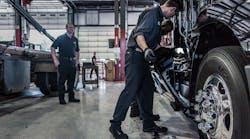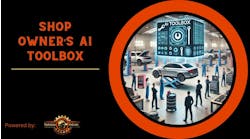With the help of training certifications, technicians can make themselves a more attractive candidate for a job, advance in their current position and earn increased wages. However, technicians aren’t the only ones who profit from earning industry certifications. In fact, fleets, shop owners, customers and other drivers on the road all can benefit from continued technician training.
Officials at the National Institute for Automotive Service Excellence (ASE) point out technicians can demonstrate their expertise by earning certifications. Additionally, employers can use ASE-certified technicians to attract more customers and produce higher-quality work. What’s more, fleets that don’t perform their own repairs can feel confident in the work performed on their vehicles by seeking out shops with qualified technicians.
ASE (www.ASE.com) is an independent non-profit organization that has worked to improve the quality of vehicle repair and service by testing and certifying automotive professionals.
“For the technician, ASE certifications start as a way to differentiate themselves when the technician is new to the industry,” says George Arrants, program director, network training and recruitment, at WheelTime and WheelTime University. “Then, as they gain more experience, certifications can be used as a gauge to measure if they are staying up with technology and all of the changes associated with it.”
WheelTime (www.WheelTime.com) is an independent truck repair network that promotes objective quality measures.
Noting that ASE certifications may indicate a technician’s level of professionalism, Arrants says fleets can look at a technician’s certifications and make sure they assign the right person for the job. For example, if a technician is certified in truck electrical repairs, that person can be assigned to an electrical complaint like slow cranking or an intermittent lights issue.
“This, in turn, will save time with the diagnosis/repair process, saving the fleet time and money,” Arrants explains.
He adds that having the right person for the job provides the customer with a more efficient technician, saving time and money and giving them confidence the repair will be made correctly.
PEAK PRODUCTIVITY
Fleets that perform their own repairs should use certified technicians to help ensure peak productivity, says Duane Tegels, diesel coordinator at WyoTech.
“A fleet’s job is to ultimately haul freight at the lowest possible cost. By running an efficient and proactive maintenance program, common repairs and vehicle downtime can be greatly reduced,” he states. “This starts with an educated repair team, which can be measured by the team’s certifications.”
WyoTech (www.WyoTech.edu) – formerly known as Wyoming Technology Institute – offers college-level, career-oriented education in the automotive, diesel, motorcycle, watercraft and collision/refinishing industries.
Neglecting certifications limits a technician’s possible career advancements and lowers customer confidence and loyalty. That, says Tegels, ultimately impacts an organization’s bottom line.
“Training and holding an organization’s technicians accountable for knowing the changes in today’s technologies is vital to a good preventive maintenance plan,” he says.
Frank Conte, an education supervisor at Universal Technical Institute (UTI), believes technicians should be required to meet minimal training standards.
“We have a CDL program to make sure that commercial vehicle drivers meet minimum standards, so why are the technicians that attempt repairs on those vehicles not required to meet some minimum standard of competence?” asks Conte. “When you call a plumber or electrician, in most states, they have to be licensed to make repairs to your home. Why is the technician replacing the brakes on an 80,000-lb truck not held to the same standards?”
UTI (www.UTI.edu) is a provider of post-secondary education for students seeking careers as professional automotive, diesel collision repair, motorcycle and marine technicians.
ASE is the only certifying body that is recognized across the entire industry, explains Conte. However, there are additional certifications available through manufacturers and OEMs.
ASE CERTIFICATIONS
Currently, there are 49 ASE certification test, spanning many areas of vehicle repair.
“There are a series of tests for medium/heavy truck, automobile, collision repair and refinishing, transit bus, school bus, truck equipment and parts specialists,” explains WheelTime’s Arrants, noting information about all tests are listed on ASE’s website. “They also offer Advanced-Level tests L1 Advanced Engine Performance, L2 Electronic Diesel Engine Diagnosis Specialist and L3 Light Duty Hybrid/Electric Vehicle Specialist.”
To become ASE certified in most specialty areas, a technician must pass one or more of the ASE certification exams and present proof of at least two years of relevant work experience, say ASE officials. Advanced-Level certification requires an additional year of experience beyond the two-year repair technician requirement, for a total of three years. ASE officials note a technician may substitute relevant formal training for up to one half of the work experience requirement.
All of the certifications hold the same value, but technicians may get more out of a test series that directly relates to an area they encounter on a regular basis.
“Focusing on the areas/systems on the vehicles the technician is repairing should be weighted,” advises Arrants. “This provides the technician, employer and customer with an increased comfort level of this individual’s ability and knowledge.”
Technicians can earn Master Technician status by passing a specified group of tests in a series. They, too, must document at least two years of relevant hands-on work experience.
To maintain Master Technician status, technicians must recertify in each test area every five years. ASE officials note there is no time limit on returning. Once technicians pass their original ASE test, they only need to take the recertification test, no matter how long it has been expired.
WyoTech’s Tegels says independent shops and small fleets have the largest challenges with gaining access to training and certifications, which makes ASE a good resource for their technicians.
“ASE is recognized on all levels of the industry for assisting with technician growth and certifications,” he says. “ASE has a path for students in pre- and post-secondary schooling, along with certifications a technician can gain after attaining two years of experience.”
“ASE certification is the only industry-wide certification that the technician can take from job to job,” adds UTI’s Conte. “Shops should only hire certified technicians as a way to demonstrate their commitment to excellence and concern for their customers.”
OE CERTIFICATIONS
Vehicle manufacturers have training for their dealer organizations and some large fleets, which provides progressive training and certification, WyoTech’s Tegels explains. This allows them to essentially grow their technicians’ confidence and abilities.
“Manufacturers may have different names for levels of technicians,” says Tegels, “but the ultimate goal is to have a highly trained and educated technician representing their brand in hopes of gaining market share through the best customer experience.”
Mike Rossetti, director of service for Isuzu Commercial Truck of America – the distributor of Isuzu commercial trucks in the United States (www.IsuzuCV.com), points out when technicians are not certified, familiar or trained on a vehicle, it takes much longer for them to make the repair. “But more important is accurately repairing the vehicle to ensure the vehicle is fixed the right time.
“Today, uptime on our vehicle is critical. If the vehicles are down, and they’re not producing revenue for the customers, then everyone is losing – the end customer that would be receiving the goods and our customer who is actually utilizing our truck as a tool for their business,” adds Rossetti.
To improve familiarity with its vehicles, Isuzu allows all of its fleets to gain access to its Isuzu Truck University website.
“We have base training modules that are available for fleet’s technicians to take,” explains Rossetti. “If there are special, more advanced classes – like hands-on classes – they can attend our training centers. Or, at that point, we also have trainers, like our fleet service reps, that will actually go to specific fleets … and we can conduct training at their location on specific components.”
He adds that Isuzu’s fleet service managers are very technical and can conduct many of these training sessions for fleets on a case-by-case basis.
Like ASE certifications, a technician stands to gain personally from acquiring more information through OE training. More certifications and more training means the technician can be more proficient in diagnosing and repairing vehicles in general.
“Technicians today, whether it be fleet or in a dealership or anywhere, as they increase knowledge and get more certifications, they’re overall compensation will usually rise right along with that,” Rossetti notes.
Fleets with certified technicians stand to gain from increased uptime because more repairs can be made in house.
“It’s imperative that they fix the vehicles right then and there instead of letting them back out and sending them to a dealer, or bringing them back in at a separate time for another technician who is more trained to go ahead and work on it,” Rossetti says.
He concludes that Isuzu and other OEMs can offer all the training they can. But the most important aspect is that technicians need to have the basic understanding and mechanical ability to actually make repairs.
“Basic electrical, basic brakes, basic suspension – things like that – are important to build that foundation so they can move on and increase their education on a specific product,” he says.
MANUFACTURER CERTIFICATIONS
Equipment manufacturers who create components installed on over-the-road trucks often provide training events and certifications to dealers, fleets and independent shops.
According to Mario Sanchez, director of on-highway marketing communications, engine business, at Cummins, as technology, emissions and customer requirements change, the company’s product portfolios become more advanced. As product complexity rises to meet these demands, the Cummins service provider network increases its need for trained technicians.
“Trade certifications standards differ from country to country, and in order for Cummins to ensure the competency of technicians, we require them to complete their product diagnosis and repair education through a combination of e-learning and hands-on activities via our global training centers,” Sanchez says. “Classes are led by factory-certified trainers, who have a wealth of information and are excellent resources to draw from.”
Cummins (www.Cummins.com) designs, distributes and services diesel and natural gas engines and related technologies, including fuel systems, controls, air handling, filtration, emission solutions and electrical power generation systems.
Sanchez explains having high standards ensures the company’s customers receive the same service, regardless of where in the world they service their engines.
“When an expert is diagnosing and repairing, they are able to isolate the problem safely, quickly and accurately, and provide timely and accurate repairs the first time, with decreased repeat failures,” he says.
Again, a technician’s familiarity with specific components leads to increased uptime for fleets as trucks can be repaired and put back in service quicker. What’s more, says Sanchez, safety standards may be negatively impacted with technicians who are not comfortable working on the product. He explains inferior quality work means greater costs over the long term and may lead to unscheduled repairs and lower vehicle availability.
Repairs that are done without following the prescribed procedures learned in training and through use of available literature, increase the chance for unnecessary risks, he adds, noting that an engine’s warranty could be impacted as a result. “By qualifying technicians, you reduce this risk.”
Cummins offers a multi-tiered approach to engine platform certification. Additionally, parts and service information can be found at Cummins QuickServe Online (quickserve.cummins.com).
INVEST IN EDUCATION
WyoTech’s Tegels says he is often asked: What happens if I train my technicians, and they leave? The fear of fleets and shop owners is that they will invest in a technician’s training and then lose that employee and correlating investment.
“My response to this is: ‘What happens if you don’t train your technicians and they stay?’” he says. “Technician training and certifications are expensive, but I believe they are not as expensive as not doing them.”
ASE certifications require a $36 registration fee. Most tests are $37 each, while Advanced-Level tests are $74 each. Recertification tests cost the same as the corresponding regular exams, with a $111 price cap that limits test fees but not the number of exams that may be taken.
So, the most anyone would have to pay to recertify in a single registration window is $147, say ASE officials, no matter how many recertification tests are taken.
Whether a technician, shop or fleet is absorbing these costs, the information is valuable.
“Technicians, and especially students, need to be able to continually learn new things,” says WheelTime’s Arrants. New information about components, diagnostic procedures and repair measures are all vital, as well new rules and regulations regarding laws and how they affect the vehicle’s performance.
“New oils and coolants also must be kept up on to make sure that the correct fluids are being used and not cause harm,” he adds.
“Students and technicians should embrace becoming life-long learners and realize training is an opportunity to better themselves within their career and craft,” agrees Tegels.
UTI’s Conte stresses the importance of certification, too, and says: “Just do it.”
“The motoring public deserves it,” he says. “Currently there is no required certification to perform the annual safety inspections on heavy trucks. Technicians and shops, according to federal law, can self-certify. Only the industry can change that by policing itself and demanding better for ourselves.”
While technicians need to understand the industry is ever-changing and they must change with it, shops and fleets must understand this as well.
“They need to help their technicians with training. Help them with access to the appropriate service information applicable to what they are working on. This is no easy job,” says Arrants. “Certification can be used as a part of this on-going training is working to test/gauge where the training is working, and where it can be improved upon.
“Certifications can be used as an add-on to payment plans, or a once-a-year bonus pay for the techs to be incentivized to continue with training/learning.”




